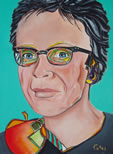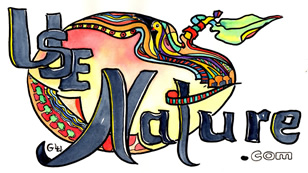useNature.com ... the Holistic Philosophy of Balance
Holistic Philosophy of Balance
Health - Relationships - Politics
Holistic Health & Lifestyle Information
Article: What is the Holistic Philosophy of Balance?
Holistic Philosophy of Balance
Article by Dieter Luske N.D.-D.C.H.-D.M.H.-D.H
Author of It happened in the seventies
What is the Holistic Philosophy of Balance?
The many meanings of "Balance".
Be in balance; it's such a nice statement, and it can be as general or as specific as one likes.
I like the many meanings and concepts of balance, but I would like to elevate it to a Holistic Philosophy.
We all know what balance means; if someone says, "You need more balance," we may have overdone something, become too one-sided or fallen off the cliff altogether. Nothing is specific here; all rather general terms mean something is out of balance.
The general balance concept relates to everything; simple examples are:
- Diet ... one cannot live by bread alone.
- Exercise .. don't do too much and burn out, but do something. - Or .. don't fall over, keep you balance.
- Work ... allow for time out and fun ... and so on ....
To see balance as a philosophy however, one has to dig deeper, find some specific meanings, and apply this knowledge.
The Five Concepts of Balance:
1. Balance Concept: One by itself can not exist (we need 2 to tango).
Balance is of the uppermost importance because we live on a planet where we need at least 2 to exist. There needs to be 2 of everything, two sides of a coin, yin and yang, plus and minus, negative and positive.
One by itself cannot exist; therefore, to be in balance, one needs the second part to be in balance with.
This principle of balance is demonstrated within the male and female principle.
The whole significance of that statement may just pass us by, but on reflection, we know that the natural consequence of balance is that both parts are always equal; no one side is better or worse.
2. Balance Concept: Equality
Equality has nothing to do with being the same.
Picture a set of scales: on one side, put 500 grams of apples; on the other, 500 grams of pears. Maybe you prefer one or the other, but to be in balance, each weighs the same.
Everything that comes in a plural version is therefore equal; male and female are equal, different but equal.
For example, "polarity", as in a "Battery"; positive and negative pole, would anyone think one is better?
Would it be possible just to have the positive pole? - Sure, you can have that, but it doesn't do anything to release the energy; we need both.
3. Balance Concept: Energy Creation
If something is in balance, like a battery's positive and negative poles, energy is created. That opens up a "new" concept - "Balance in Energy Creation".
For starters, if a man and a woman live in balance, they will create energy, meaning they will achieve more together than they could have individually. - Sometimes, this energy is extended into Synergy, where the sum of the whole far outweighs that of the individuals.
However, suppose one of the couples perceives the other as not being equal. In that case, less energy is created, down to the point whereby fighting or point-scoring against each other makes no energy at all, and the outcome is zero.
Can the plurality and balance philosophy be applied to our political system? - Are they working against each other, or do they create Synergy?
The misinterpretation of the word opposition as opposing has created problems. Instead of just being on the opposite side of the equation, the political concept of opposition, as in fighting everything, has created a vacuum in energy output for most political endeavours, with only little political progress made.
Political parties keep themselves busy by putting each other down, which is not a productive endeavour for a country.
The concept of voting that one party is better or knows better than any other is based on ideology. Party political reasons are the main driving force defending a righteous ideology.
Instead, a truly inspiring and working party system could create Synergy, resulting in a genuinely inspiring outcome and vision for the future.
4. Balance Concept: Right or Wrong
Most decisions are based on right or wrong, a balance principle. In reality, there is no right and wrong as we perceive it.
Balance is always created by having two sides; therefore, the term wrong, as we see it, simply means it is part of the balance, and it is needed as much as the right side.
Right and wrong are equals as much as male and female, or positive and negative are equals.
That may create an outcry, "Surely, to kill someone is wrong", and .. yes, it is, and we should understand that and stop it".
In other words, right and wrong are created by what we accept and agree upon.
To live in balance, we do something which may be wrong, and then we correct it, which may be right. We have created balance, which has created energy to move on, and that specific item, "killing", should be way beyond us.
It should be evident that killing is out; it should have become a universal value truth where everyone agrees.
That's what a universal value is, something we all have learnt to be true or working best for the human race, and therefore, it is an agreed universal value truth.
5. Balance Concept: Breaking Point
Now, we come to another principle of balance, which often is overlooked.
Not everything can be balanced - if one side becomes too extreme, the counterweight will break the balance altogether. - Hence the phrase "it has reached breaking point".
There is only so much which can be balanced. That is not to say that everything is lost; it simply means it has to be brought closer again. Baby steps have to be made, slowly and surely reaching out to each other to reach the point where balance is possible once again.
Ideologies in any form are counterproductive.
The problem is NOT the ideology, which can be seen simply as an idea.
The problem is that people become self-righteous and defend their ideology because it would be too hard to admit being wrong.
Therefore, too much energy is spent proving someone else's ideology wrong.
Interestingly, different ideologies could support a perfect balance. The differences could be seen as enriching rather than threatening one's truth.
Here's a simple demonstration of insisting on being right, therefore being righteous, therefore NOT being in balance:
Try to walk forward while moving only your right leg.
The left leg stands still as you take the right leg forward, again and again ..
Finally, you realise .... you are walking in circles.
... Lets not do that ..
.. So, how to create balance in your life? Add what's missing ...
.. your comments are welcome ...
Please post comments on our Facebook Page
Article supplied by the editor of useNature - Dieter Luske
* Disclaimer - Any general advice given in any article should not be relied upon and should not be taken as a substitute for visiting a qualified medical Doctor.
 Dieter Lüske - Editor
Dieter Lüske - Editor
N.D.-D.C.H.-D.M.H.-D.H
Buy Now
It happened in the seventies
Intriguing story of personal risk-taking, self-discovery and profound change.
Dieter Luske
author . writer . editor
Holistic Philosophies
useNature Magazine
Facebook Groups:
© 1998 - 2025 useNature.com: Australia - Dieter Luske - Writer - Creative Lifestyle Portal - Natural Holistic Health - Books & Art -


